1. Early Life and Background
Evonne Goolagong Cawley's early life was shaped by her Indigenous heritage and the societal challenges prevalent in Australia during her childhood.
1.1. Birth and Family
Evonne Fay Goolagong was born on July 31, 1951, in Griffith, New South Wales, Australia. She was the third of eight children in an Indigenous Australian family belonging to the Wiradjuri people. Her father, Ken Goolagong, worked as a sheep shearer, and her mother, Melinda, was a homemaker. The family grew up in the small country town of Barellan.
1.2. Childhood and Education
Goolagong grew up during a period in Australia marked by the Stolen Generations, a government policy that forcibly removed Indigenous children from their families. She was directly impacted by this, recalling instances where her mother would tell her to hide under the bed when a shiny car approached, fearing that "the welfare man" would take her away. Despite the widespread disadvantage and prejudice faced by Aboriginal people in rural Australia at the time, Goolagong was introduced to tennis in Barellan from a young age. This opportunity arose thanks to a local resident, Bill Kurtzman, who noticed her peering through the fence at the local courts and encouraged her to come in and play.
In 1965, Vic Edwards, the proprietor of a tennis school in Sydney, was alerted to Goolagong's potential by two of his assistants. He traveled to Barellan to observe her play and immediately recognized her talent. Edwards persuaded her parents to allow her to move to Sydney, where she attended Willoughby Girls High School. During this time, she lived with Edwards's family, as he became her legal guardian, coach, and manager. She completed her School Certificate in 1968.
2. Playing Career
Evonne Goolagong Cawley's professional tennis career spanned from the late 1960s to the early 1980s, during which she achieved significant success, including multiple Grand Slam titles and a world No. 1 ranking.
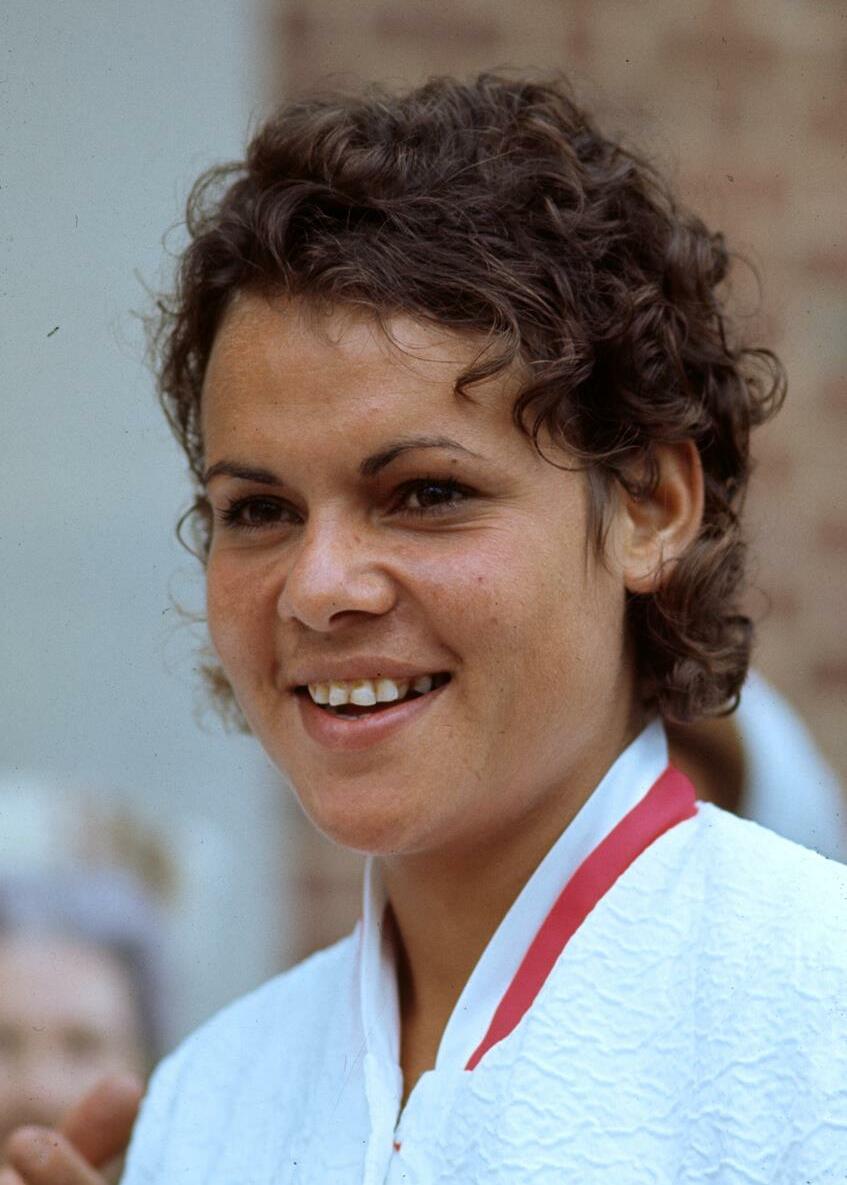
2.1. Debut and Early Career
Goolagong made her professional debut in the late 1960s. Her rise to prominence began in the early 1970s, culminating in her first Grand Slam singles final appearance in January 1971 at the Australian Open. At the age of 19, in 1971, she achieved a remarkable breakthrough by winning the French Open singles championship and the Australian Open women's doubles championship, partnering with Margaret Court. Her success continued that year when she secured her first Wimbledon women's singles title.
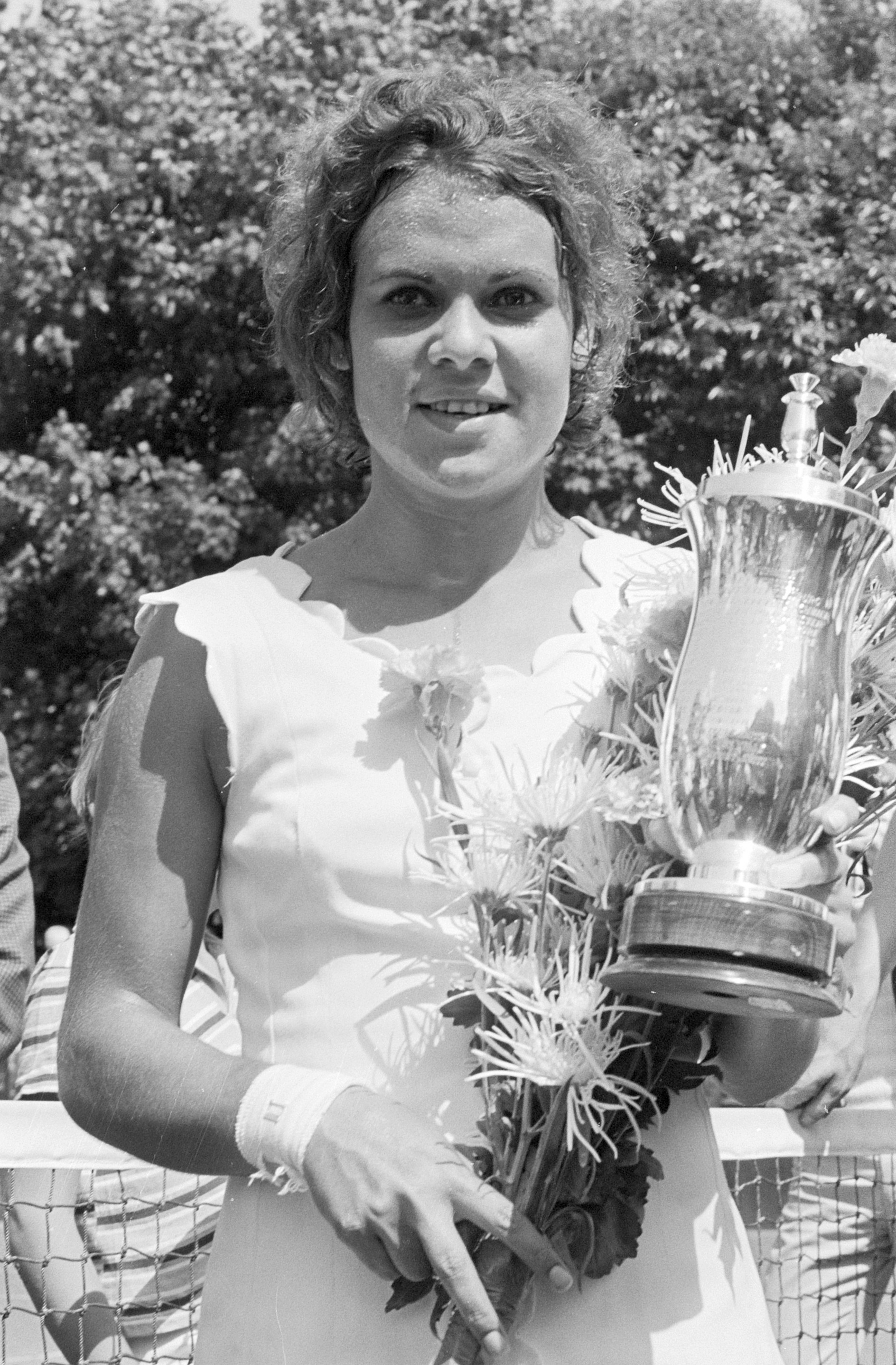
2.2. Grand Slam Singles Career
Goolagong Cawley won seven Grand Slam singles titles in her career, reaching a total of 18 Grand Slam singles finals. Her victories include four Australian Open titles (1974, 1975, 1976, 1977 December), one French Open title (1971), and two Wimbledon titles (1971, 1980). She is particularly notable for winning the 1980 Wimbledon title as a mother, becoming the first mother to do so in 66 years.
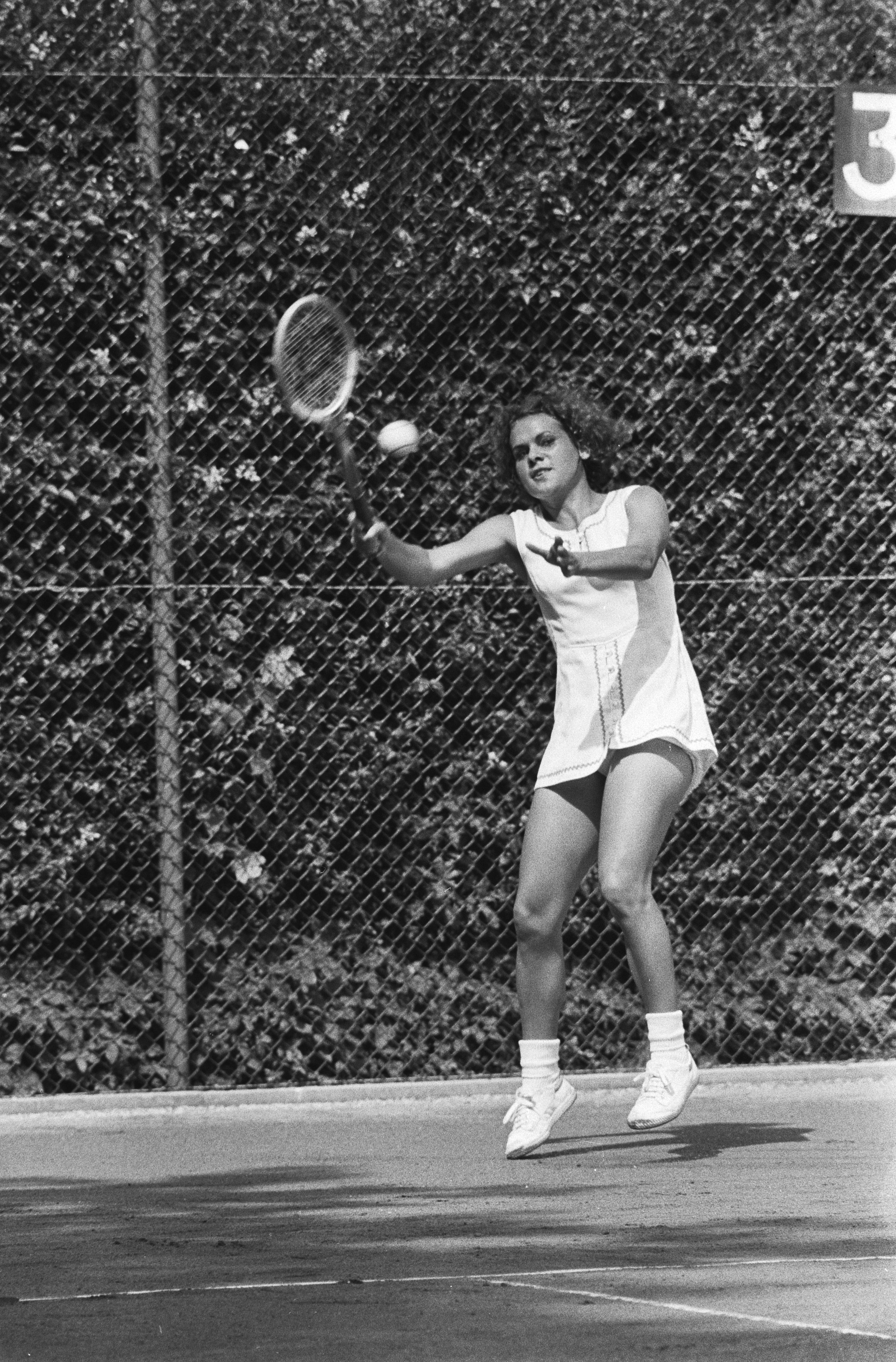
Despite her success in other majors, Goolagong Cawley never won the US Open. She reached four consecutive US Open singles finals from 1973 to 1976 but lost all of them, a unique record in US Championships history. She also made seven consecutive finals at the Australian Open, winning three titles in a row.
After reaching the final in her first two appearances at the French Open in 1971 and 1972, Goolagong did not compete at Roland Garros for a decade. This absence was partly due to a ban imposed by the French Tennis Federation on all World Team Tennis contracted players from the 1974 event. As the reigning Australian Open champion, Goolagong, along with Jimmy Connors, spearheaded legal action against the French authorities, feeling deprived of the opportunity to achieve a calendar Grand Slam. She boycotted the event even after the ban was lifted, only returning in 1983 for her final Grand Slam singles appearance, where she lost in the third round to Chris Evert. Her very last Grand Slam appearance was at the 1983 Wimbledon Championships in women's doubles.
2.3. Doubles and Mixed Doubles Career
In addition to her singles achievements, Goolagong Cawley was also a formidable doubles player, winning six women's doubles Grand Slam titles and one mixed doubles Grand Slam title. She won the Australian Open women's doubles five times (1971, 1974, 1975, 1976, 1977 December). Her partners included Margaret Court (1971) and Peggy Michel (1974, 1975). In 1974, she teamed with Peggy Michel to win the ladies' doubles title at Wimbledon. She also won the French Open mixed doubles title in 1972 with Kim Warwick.
The shared women's doubles title at the Australian Open in December 1977 is not traditionally counted in Goolagong's win total because the finals were never played due to rain. There was also some confusion regarding the 1977 Wimbledon Ladies Doubles event, where her compatriot Helen Gourlay (also married to a "Cawley") won the trophy, leading to occasional incorrect credit for Evonne Goolagong Cawley, who did not participate in Wimbledon 1977.
2.4. Fed Cup Participation
Goolagong Cawley proudly represented Australia in the Fed Cup (now Billie Jean King Cup) on three occasions. She played a pivotal role in Australia's victories in 1971, 1973, and 1974. Following her playing career, she also served as the Fed Cup captain for three consecutive years, demonstrating her continued commitment to Australian tennis.
2.5. Major Rivals
Goolagong Cawley's career was marked by significant rivalries with other top players of her era, most notably Chris Evert and Martina Navratilova. Her matches against Evert, particularly in Grand Slam finals, were defining moments in women's tennis. For instance, she lost to Evert in the 1975 and 1976 US Open finals and the 1976 Wimbledon final, but famously defeated Evert in the 1980 Wimbledon final.
Her rivalry with Navratilova also evolved over time. Prior to her first pregnancy in 1976, Goolagong led Navratilova 11-4 in their head-to-head encounters. However, after her daughter was born, she lost 11 of their subsequent 12 matches, finishing her career trailing Navratilova 12-15. Despite this, she scored a notable victory over Navratilova at the Virginia Slims of Boston in March 1978, where she also beat Evert back-to-back to win the title.
2.6. Career Statistics and Records
Goolagong Cawley ended her career with an impressive win/loss percentage of 81.0% (704-165). Her win/loss performance in all Grand Slam singles tournaments was 82.1% (133-29). Specifically, her Grand Slam singles win percentages were: French Open 84.2% (16-3), Wimbledon 83.3% (50-10), US Open 81.3% (26-6), and Australian Open 80.4% (41-10).
She was ranked No. 1 in the world in women's tennis for two weeks in 1976. This fact was not reported at the time due to incomplete data used in ranking calculations, and it was only discovered and officially recognized in December 2007, 31 years later. She was the second woman to hold the top spot, and the 16th overall by the time her ranking was finally acknowledged.
Goolagong Cawley holds several unique records in the Open Era:
- Wimbledon (1980):** She is the only singles champion in Wimbledon history to defeat four top-ten seeded players in a single tournament (Hana Mandlíková #9, Wendy Turnbull #6, Tracy Austin #2, and Chris Evert #3). She also beat two former Grand Slam finalists, Sharon Walsh and Betty Stöve, in earlier rounds.
- US Open (1973-1976):** She is the only player in US Open history to be a runner-up in four consecutive finals.
- French Open (1971):** She won the title on her first attempt, a feat also achieved by Margaret Osborne duPont and Althea Gibson in the pre-Open Era.
- Wimbledon (1980):** She is the only mother to have won the Wimbledon title since Dorothea Lambert Chambers in 1914.
- Australian Open (1971-1976):** She reached six consecutive finals, a record she shares with Martina Hingis.
- Australian Open (1975-1977):** She achieved three wins without losing a set, a record shared with Steffi Graf. The Australian Open was held twice in 1977 (January and December); Goolagong Cawley did not play in the January edition but won the December tournament.
- Australian Open (1974-1976):** She won three consecutive titles, a record shared with Margaret Court, Steffi Graf, Monica Seles, and Martina Hingis.
3. Personal Life
Beyond her illustrious tennis career, Evonne Goolagong Cawley's personal life was marked by significant relationships and family milestones.
3.1. Marriage and Family
Evonne Goolagong married Roger Cawley, a former junior British tennis player, on June 19, 1975. Following her wedding, she initially settled in Naples, Florida. The couple has two children: a daughter, Kelly, born in 1977, and a son, Morgan Kiema Cawley, born in 1981. After meeting many Indigenous Australian relatives for the first time at her mother's funeral, the Cawleys decided to move back to Australia, buying a home in Noosa Heads, Queensland, where they settled with their two United States-born children. Her daughter, Kelly, is involved in running her tennis camps. Her son, Morgan, played in the National Soccer League. Evonne Goolagong is also the maternal great-aunt of National Rugby League player Latrell Mitchell, who was born Latrell Goolagong. Her brother, Ian Goolagong, was an amateur tennis player who partnered with Evonne in the mixed doubles tournament at Wimbledon in 1982. As of 2015, Ian Goolagong was the president and coach at the Lalor Tennis Club in Victoria, Australia.
3.2. Relationships and Background
Goolagong's early career was closely managed by Vic Edwards, who became her legal guardian, coach, and manager. She later revealed that Edwards made sexual advances towards her. Her relationship with Edwards became strained after she met Roger Cawley in 1971. Edwards maintained control over every aspect of her career and finances until her marriage to Roger Cawley in 1975. Upon her marriage, Goolagong severed all contact with Edwards, although he remained her official coach for Wimbledon 1975. During that tournament, Edwards and Goolagong were no longer on speaking terms, with Edwards sitting on the opposite side of the players' box from Roger Cawley at her matches. Roger Cawley then took over as her coach, hitting partner, and manager.
A significant personal event was the death of her father, Ken Goolagong, in a car crash in 1974. This occurred shortly after Edwards had refused to release any of her money to purchase a new family vehicle as requested. Her mother, Melinda, passed away in 1991.
4. Post-Tour Activities and Social Contribution
After retiring from professional tennis, Evonne Goolagong Cawley remained actively involved in the sport and dedicated herself to significant social contributions, particularly focusing on Indigenous youth.
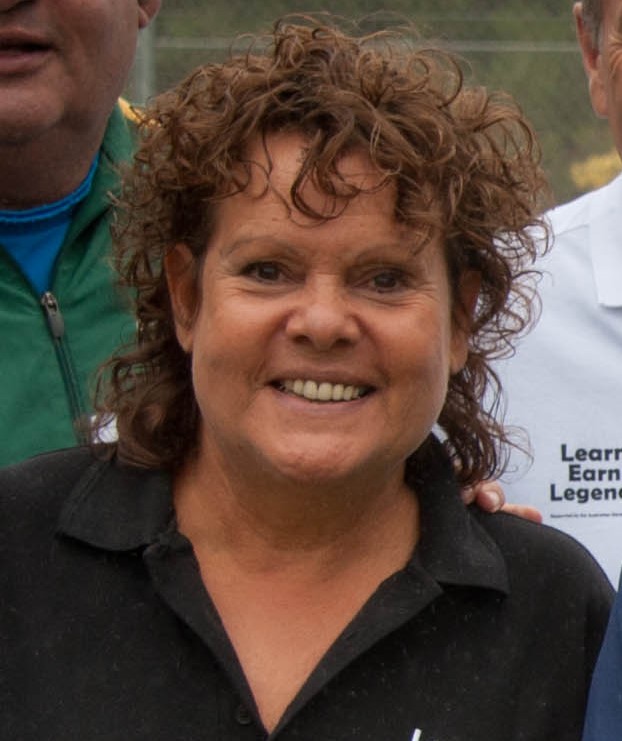
4.1. Post-Retirement Activities
During her playing career and extending into her retirement, Goolagong Cawley engaged in numerous product endorsements and appeared in television and print commercials for brands such as KFC (appearing with her husband Roger), Geritol, and Sears. At Sears, she also promoted her own sports clothing brand, 'Go Goolagong'.
While she officially retired from competitive play in 1983, she made a brief return in May 1985 to compete at the Australian Indoor Championship, where she lost her only match. In 1990, Goolagong began participating in senior invitational competitions, including the inaugural ladies' senior invitational doubles at Wimbledon alongside compatriot Kerry Melville Reid. She also spent time as a touring professional at the Hilton Head Racquet Club in South Carolina before returning to Australia.
4.2. Sports Administration and Ambassador Roles
Goolagong Cawley has held various leadership roles in sports administration. She was a member of the Board of the Australian Sports Commission from 1995 to 1997. Since 1997, she has served as a Sports Ambassador to Aboriginal and Torres Strait Islander Communities, a role that underscores her commitment to Indigenous Australians. In 2002, she was appointed captain of the Australian Fed Cup team. In 2003, she was honored with the International Olympic Committee's "Women and Sports Trophy" for the Oceania region, recognizing her contributions to sports and gender equality.
4.3. Indigenous Youth Support
A cornerstone of Goolagong Cawley's post-retirement work is her dedicated effort to support Indigenous Australian youth. She leads an annual "Goolagong National Development Camp," which aims to encourage Aboriginal children to stay in school through participation in competitive tennis. This program seeks to identify and nurture young talent while promoting educational attainment.
In October 2023, Goolagong Cawley demonstrated her ongoing advocacy by signing an open letter along with 24 other Australians of the Year in support of the Yes vote in the Indigenous Voice referendum. This initiative, led by psychiatrist Patrick McGorry, aimed to establish an Indigenous Voice to Parliament.
5. Awards and Recognition
Evonne Goolagong Cawley has received numerous prestigious honors and awards throughout her career and life, recognizing her exceptional contributions to tennis and her significant impact on Australian society, particularly for Indigenous communities.
5.1. National Honors and Awards
In 1971, Goolagong was named Australian of the Year, a significant national accolade. Her service to the nation was further recognized with royal and national honors: she was appointed a Member of the Order of the British Empire (MBE) in 1972 and an Officer of the Order of Australia (AO) in 1982. In 2018, she was advanced to a Companion of the Order of Australia (AC), the highest civilian honor, "for eminent service to tennis as a player at the national and international level, as an ambassador, supporter and advocate for the health, education and wellbeing of young Indigenous people through participation in sport, and as a role model."
5.2. Sports Honors
Her athletic achievements have been celebrated through inductions into several prestigious sports halls of fame. In 1985, she was inducted into the Sport Australia Hall of Fame. Three years later, in 1988, Goolagong Cawley was inducted into the International Tennis Hall of Fame. She was also recognized in the Aboriginal Sporting Hall of Fame in 1989.
5.3. Other Honors and Awards
Goolagong Cawley has received various other accolades acknowledging her impact on the sport and beyond. She was awarded the WTA Karen Krantzcke Sportsmanship Award in both 1978 and 1980, recognizing her fair play and integrity on the court. The women's champion trophy at the Brisbane International tennis tournament is named the Evonne Goolagong Cawley Trophy in her honor.
In 1993, the State Transit Authority named a RiverCat ferry in Sydney after her, which travels daily from Parramatta to Circular Quay.
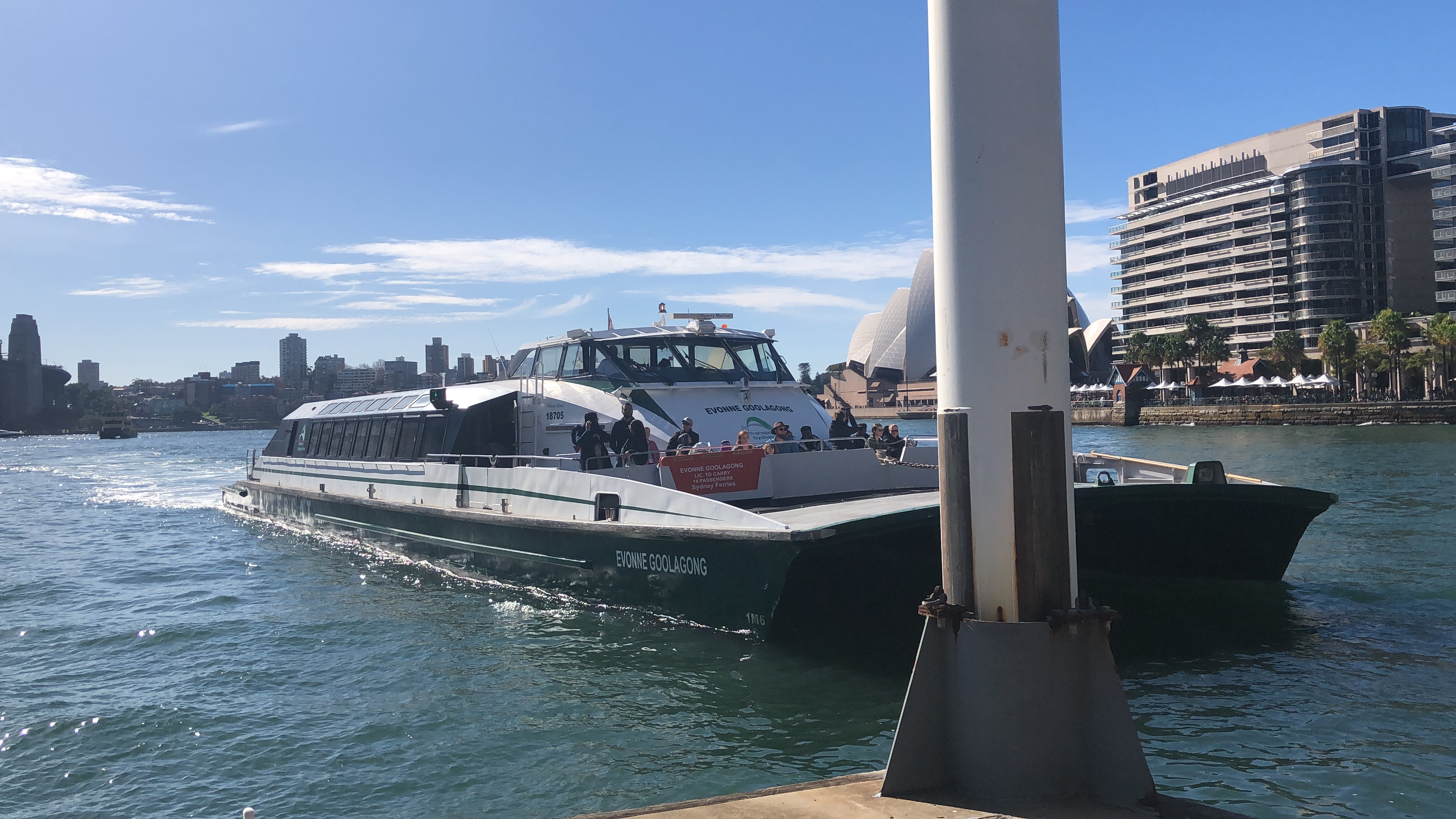
The National Museum of Australia houses the Evonne Goolagong Cawley collection of memorabilia, including her 1971 and 1980 Wimbledon singles trophies, her 1974 doubles win trophy, two racquets used in these tournaments, a signed warm-up jacket, and a dress with a bolero-style top designed by Ted Tinling from the early 1970s.

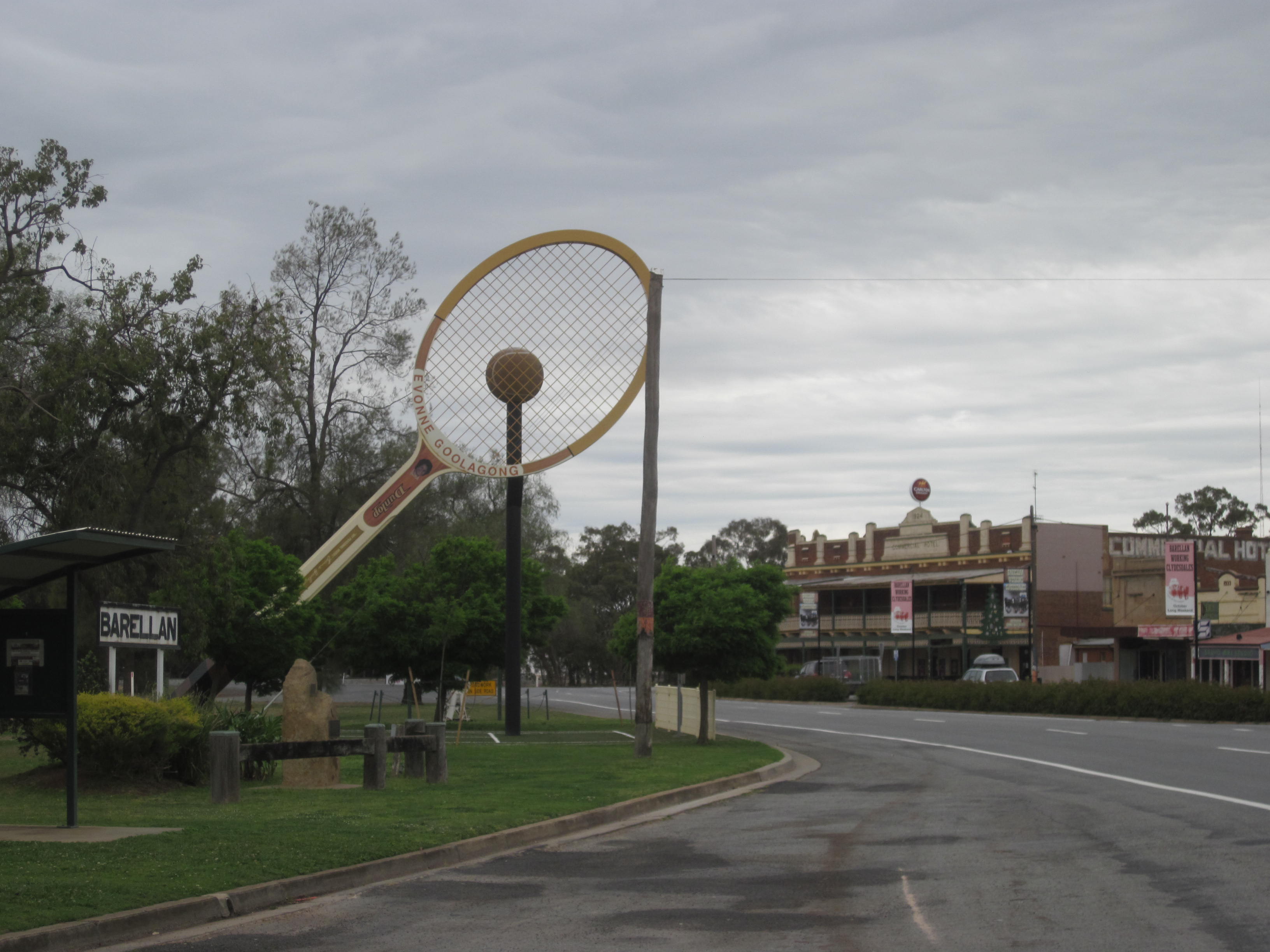
In 2001, Goolagong was inducted into the Victorian Honour Roll of Women for her achievements as a tennis player. Her hometown of Barellan erected a 45 ft (13.8 m) long replica of a tennis racquet she used in Evonne Goolagong Park, which she unveiled during Barellan's centenary celebrations on October 3, 2009. In February 2016, Australia Post honored Goolagong and ten other Australian tennis players as recipients of the 2016 Australia Post Legends Award, featuring them on a postage stamp set titled "Australian Legends of Singles Tennis." In April 2016, the University of South Australia awarded her an honorary doctorate in recognition of her distinguished service to the community. In June 2018, the International Tennis Federation (ITF) presented her with its highest accolade, the Philippe Chatrier Award, for her outstanding contributions to tennis.
6. Legacy and Impact
Evonne Goolagong Cawley's legacy extends far beyond her remarkable tennis career, profoundly influencing the sport, Australian society, and particularly Indigenous communities.
6.1. Impact on Tennis
Goolagong Cawley is widely regarded as one of the all-time greatest players in women's tennis history. Her fluid style of play, athleticism, and sportsmanship captivated audiences worldwide. Her achievements, including seven Grand Slam singles titles and a world No. 1 ranking, cemented her place among the elite. She inspired subsequent generations of athletes, both through her on-court prowess and her dignified conduct. Her unique accomplishment of winning Wimbledon as a mother in 1980 also set a powerful precedent, demonstrating resilience and dedication.
6.2. Impact on Indigenous Communities
As an Indigenous Australian, Evonne Goolagong Cawley became a trailblazer and an immensely significant role model for her people. Her success on the international stage shattered stereotypes and brought much-needed positive attention to Indigenous Australians. She used her platform to raise social awareness and promote opportunities for Indigenous youth, particularly through her Goolagong National Development Camp. Her efforts have been instrumental in encouraging Indigenous children to pursue education and participate in sports, fostering a sense of pride and possibility within their communities. Her journey from a small country town to global tennis stardom serves as a powerful testament to overcoming adversity and achieving dreams.
6.3. Cultural Impact
Goolagong Cawley's life and achievements have resonated deeply within Australian culture, leading to various artistic and commemorative works. A play based on her life, titled Sunshine Super Girl, written and directed by Andrea James, premiered in Griffith, New South Wales, in October 2020, before a run at the Sydney Festival in January 2021. This theatrical production further immortalizes her story and impact. Monuments, such as the 45 ft (13.8 m) replica tennis racquet in Barellan, and museum collections, like those at the National Museum of Australia, serve as permanent tributes to her enduring legacy and cultural significance.
7. Criticism and Controversy
During her career, Evonne Goolagong Cawley faced a notable instance of criticism related to the racial policies of the time. In 1972, she participated in a segregated tournament in South Africa during the era of apartheid. To exempt her from the discriminatory practices applied to non-white individuals, the South African authorities controversially classified her as an "honorary white." This classification, while intended to allow her to compete without facing overt racial discrimination, highlighted the systemic injustice of apartheid and drew criticism for its underlying premise.
8. Autobiography
In 1993, Evonne Goolagong Cawley co-authored her autobiography with Phil Jarrett, titled Home! The Evonne Goolagong Story. The book provides her personal account of her life, career, and experiences, including her reflections on her Indigenous heritage, the challenges she faced, and her journey to becoming a world champion.
9. Career Statistics
9.1. Grand Slam tournament performance timeline
| Tournament | 1967 | 1968 | 1969 | 1970 | 1971 | 1972 | 1973 | 1974 | 1975 | 1976 | 1977 | 1978 | 1979 | 1980 | 1981 | 1982 | 1983 | SR | W-L | Win % | |
|---|---|---|---|---|---|---|---|---|---|---|---|---|---|---|---|---|---|---|---|---|---|
| Australian Open | 3R | 3R | 2R | QF | F | F | F | W | W | W | A | W | A | A | 2R | QF | 2R | A | 4 / 14 | 41-10 | 80.4% |
| French Open | A | A | A | A | W | F | SF | A | A | A | A | A | A | A | A | A | 3R | 1 / 4 | 16-3 | 84.2% | |
| Wimbledon | A | A | A | 2R | W | F | SF | QF | F | F | A | SF | SF | W | A | 2R | A | 2 / 11 | 49-9 | 84.5% | |
| US Open | A | A | A | A | A | 3R | F | F | F | F | A | A | QF | A | A | A | A | 0 / 6 | 26-6 | 81.3% | |
| Win-loss | 2-1 | 2-1 | 1-1 | 3-2 | 16-1 | 15-4 | 18-4 | 14-2 | 15-2 | 16-2 | 5-0 | 4-1 | 9-2 | 7-1 | 2-1 | 1-2 | 2-1 | 7 / 35 | 132-28 | 82.5% | |
| Year-end ranking | |||||||||||||||||||||
| 5 | 2 | - | 3 | 4 | 5 | ||||||||||||||||
| 17 | 37 | ||||||||||||||||||||
Note: The Australian Open was held twice in 1977, in January and December. Goolagong won the December edition. She was seeded fourth for the 1980 US Open Championships, but withdrew from the tournament before play began due to a recurring back injury and the early stages of her second pregnancy.
9.2. Grand Slam tournament finals
9.2.1. Singles: 18 (7-11)
| Result | Year | Championship | Surface | Opponent | Score |
|---|---|---|---|---|---|
| Loss | 1971 | Australian Open | Grass | Margaret Court | 6-2, 6-7(0-7), 5-7 |
| Win | 1971 | French Open | Clay | Helen Gourlay | 6-3, 7-5 |
| Win | 1971 | Wimbledon | Grass | Margaret Court | 6-4, 6-1 |
| Loss | 1972 | Australian Open | Grass | Virginia Wade | 4-6, 4-6 |
| Loss | 1972 | French Open | Clay | Billie Jean King | 3-6, 3-6 |
| Loss | 1972 | Wimbledon | Grass | Billie Jean King | 3-6, 3-6 |
| Loss | 1973 | Australian Open | Grass | Margaret Court | 4-6, 5-7 |
| Loss | 1973 | US Open | Grass | Margaret Court | 6-7(2-7), 7-5, 2-6 |
| Win | 1974 | Australian Open | Grass | Chris Evert | 7-6(7-5), 4-6, 6-0 |
| Loss | 1974 | US Open | Grass | Billie Jean King | 6-3, 3-6, 5-7 |
| Win | 1975 | Australian Open (2) | Grass | Martina Navratilova | 6-3, 6-2 |
| Loss | 1975 | Wimbledon | Grass | Billie Jean King | 0-6, 1-6 |
| Loss | 1975 | US Open | Clay | Chris Evert | 7-5, 4-6, 2-6 |
| Win | 1976 | Australian Open (3) | Grass | Renáta Tomanová | 6-2, 6-2 |
| Loss | 1976 | Wimbledon | Grass | Chris Evert | 3-6, 6-4, 6-8 |
| Loss | 1976 | US Open | Clay | Chris Evert | 3-6, 0-6 |
| Win | 1977 | Australian Open [Dec.] (4) | Grass | Helen Gourlay | 6-3, 6-0 |
| Win | 1980 | Wimbledon (2) | Grass | Chris Evert | 6-1, 7-6(7-4) |
9.2.2. Women's doubles: 7 (6-1)
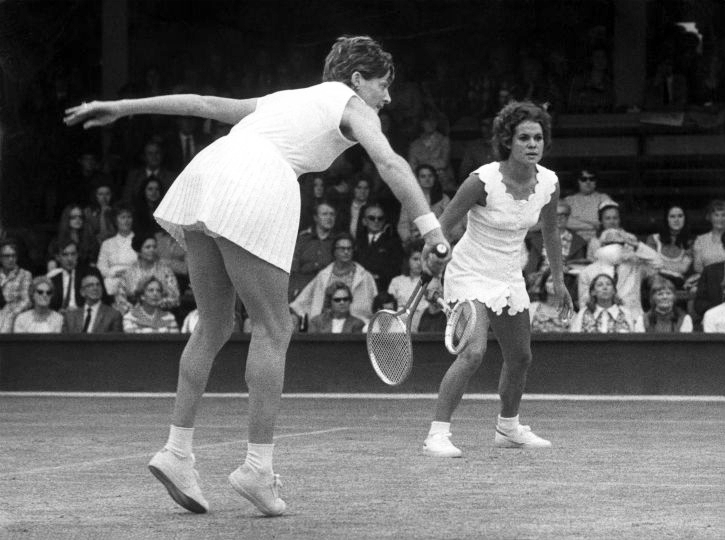
| Result | Year | Championship | Surface | Partner | Opponents | Score |
|---|---|---|---|---|---|---|
| Win | 1971 | Australian Open | Grass | Margaret Court | Jill Emmerson | 6-0, 6-0 |
| Loss | 1971 | Wimbledon | Grass | Margaret Court | Rosemary Casals | 3-6, 2-6 |
| Win | 1974 | Australian Open (2) | Grass | Peggy Michel | Kerry Harris | 7-5 6-3 |
| Win | 1974 | Wimbledon | Grass | Peggy Michel | Helen Gourlay | 2-6, 6-4, 6-3 |
| Win | 1975 | Australian Open (3) | Grass | Peggy Michel | Margaret Court | 7-6, 7-6 |
| Win | 1976 | Australian Open (4) | Grass | Helen Gourlay | Renáta Tomanová | 8-1 |
| Win | 1977 | Australian Open [Dec.] (5) | Grass | Helen Gourlay | Mona Guerrant | Shared - final rained out |
9.2.3. Mixed doubles: 2 (1-1)
| Result | Year | Championship | Surface | Partner | Opponents | Score |
|---|---|---|---|---|---|---|
| Win | 1972 | French Open | Clay | Kim Warwick | Françoise Dürr | 6-2, 6-4 |
| Loss | 1972 | Wimbledon | Grass | Kim Warwick | Rosemary Casals | 4-6, 4-6 |
9.3. Records
- These records were attained in the Open Era of tennis.
- Records in bold indicate peer-less achievements.
| Championship | Years | Record accomplished | Player tied |
|---|---|---|---|
| Australian Open | 1971-1976 | 6 consecutive finals | Martina Hingis |
| Australian Open | 1975-1977 | 3 wins without losing a set | Steffi Graf |
| Australian Open | 1974-1976 | 3 consecutive titles | Margaret Court Steffi Graf Monica Seles Martina Hingis |
| French Open | 1971 | Won title on the first attempt | Stands alone |
| Wimbledon | 1980 | Won Wimbledon as a mother | Dorothea Lambert Chambers |
| Wimbledon | 1980 | Only singles champion to defeat four top ten seeds (Mandlikova #9, Turnbull #6, Austin #2, Evert-Lloyd #3) | Stands alone |
| US Open | 1973-1976 | 4 consecutive runner-ups | Stands alone |